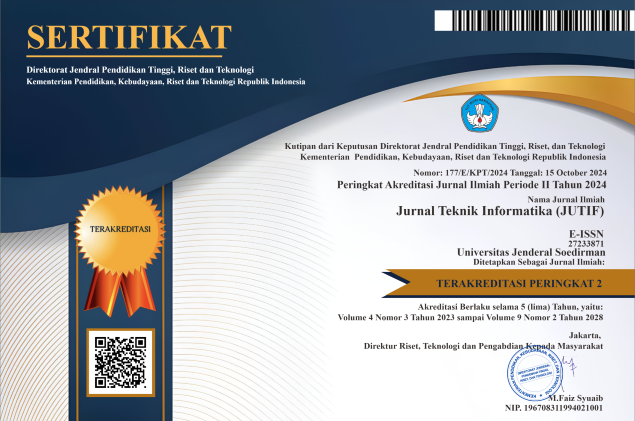EXPERIMENTAL COMPARISON OF MACHINE LEARNING ALGORITHM PERFORMANCE FOR OPTIMIZING ELECTIVE SUBJECT SELECTION IN PHASE F OF THE MERDEKA CURRICULUM
DOI:
https://doi.org/10.52436/1.jutif.2024.5.4.1983Keywords:
cross validation, decision tree, KNN, machine learning, merdeka curriculum phase f, naive bayes, random forest, small dataset, SVMAbstract
In phase f of the Merdeka Curriculum, electives are an important element at the senior high school level. Students are faced with the challenge of choosing four out of twelve elective subjects that are relevant to their talents, interests, further study plans and career goals over a two-year study period. Applying machine learning with the right algorithm is a solution for the effectiveness and efficiency of elective selection. The dataset used comes from the 10th grade report card data, the results of the interest, aptitude, further study, and career choice tests, and the manual selection of electives chosen by students in the previous year. The use of a small data set requires a cross-validation method to improve the generalizability of the model and to optimize the data set, thereby increasing the validity of the results. The test will be conducted using an application that tests five machine learning algorithm models suitable for small datasets, namely Naive Bayes, Decision Tree, Random Forest, Support Vector Machine, and k-Nearest Neighbors. The test focuses on comparing the performance of the five algorithms based on the best accuracy, recall, and confusion matrix and the results obtained Support Vector Machine (SVM) algorithm has the best performance results by achieving the highest accuracy of 57.3770%, the highest recall of 0.574, and the highest true positive (TP) of 0.574. The Support Vector Machine (SVM) algorithm will be a recommendation for further research, namely the development of machine learning for the selection of f-stage elective subjects at Atisa Dipamkara senior high school, to provide relevant guidance to students in making decisions regarding the selection of elective subjects more accurately and according to their respective characteristics.
Downloads
References
S. Ariga, “Implementasi Kurikulum Merdeka Pasca Pandemi Covid-19,” EDU Soc. J. PENDIDIKAN, ILMU Sos. DAN Pengabdi. Kpd. Masy., vol. 2, no. 2, pp. 662–670, Aug. 2023, doi: 10.56832/edu.v2i2.225.
M. D. R. Adhyatma, “Program Pendampingan Integrasi Bakat dan Minat dalam Memilih Mata Pelajaran sebagai Implementasi Kurikulum Merdeka Tingkat Sekolah Menengah Atas (SMA),” Bubungan Tinggi J. Pengabdi. Masy., vol. 5, no. 4, p. 1651, Dec. 2023, doi: 10.20527/btjpm.v5i4.9572.
L. LÓPEZ-GARCÍA, C. LINO-RAMÍREZ, V. M. ZAMUDIO-RODRÍGUEZ, and J. DEL VALLE- HERNÁNDEZ, “Predictive model for the analysis of academic performance and preventing student dropout using machine learning techniques,” Rev. Educ. Técnica, pp. 1–5, Nov. 2022, doi: 10.35429/JOTE.2022.16.6.1.5.
J. Rust and S. Autexier, “Causal Inference for Personalized Treatment Effect Estimation for given Machine Learning Models,” in 2022 21st IEEE International Conference on Machine Learning and Applications (ICMLA), IEEE, Dec. 2022, pp. 1289–1295. doi: 10.1109/ICMLA55696.2022.00206.
A. Prayoga Permana, K. Ainiyah, and K. Fahmi Hayati Holle, “Analisis Perbandingan Algoritma Decision Tree, kNN, dan Naive Bayes untuk Prediksi Kesuksesan Start-up,” 2021. [Online]. Available: https://www.kaggle.com/manishkc06/startup-success-prediction.
D. P. B, M. K, V. K, and Y. D, “Job and Course Recommendation System using Collaborative Filtering and Naive Bayes algorithms,” in 2023 2nd International Conference on Advancements in Electrical, Electronics, Communication, Computing and Automation (ICAECA), IEEE, Jun. 2023, pp. 1–4. doi: 10.1109/ICAECA56562.2023.10200758.
A. H. Wicaksono, A. A. Supianto, S. H. Wijoyo, D. Krisnandi, and A. Heryana, “KLASIFIKASI SISWA SLOW LEARNER UNTUK MENDUKUNG SEKOLAH DALAM MENINGKATKAN PEMAHAMAN SISWA MENGGUNAKAN ALGORITMA NAÏVE BAYES,” vol. 9, no. 3, pp. 589–596, 2022, doi: 10.25126/jtiik.202295509.
P. Kragbi Olivier, K. Tiemoman, and K. Koffi, “MODEL OF A PERSONALISED E-LEARNING PROCESS BASED ON A DECISION TREE ALGORITHM,” Int. J. Adv. Res., vol. 11, no. 11, pp. 371–382, Nov. 2023, doi: 10.21474/IJAR01/17839.
B. Charbuty and A. Abdulazeez, “Classification Based on Decision Tree Algorithm for Machine Learning,” J. Appl. Sci. Technol. Trends, vol. 2, no. 01, pp. 20–28, Mar. 2021, doi: 10.38094/jastt20165.
A. B. Wiratman and W. Wella, “Personalized Learning Models Using Decision Tree and Random Forest Algorithms in Telecommunication Company,” JOIV Int. J. Informatics Vis., vol. 8, no. 1, Mar. 2024, doi: 10.62527/joiv.8.1.1905.
Z. Shu, Q. Shen, and T. Zeng, “Research and Application of Music Personalized Recommendation System Based on Random Forest Algorithm,” in 2023 IEEE 6th Information Technology,Networking,Electronic and Automation Control Conference (ITNEC), IEEE, Feb. 2023, pp. 1387–1391. doi: 10.1109/ITNEC56291.2023.10082503.
W. Alsahly, K. Poterlowicz, and H. Aldoghaither, “Using Random Forest and a Hybrid model to Predict Drug Response in Skin Cutaneous Melanoma,” in 2023 IEEE International Biomedical Instrumentation and Technology Conference (IBITeC), IEEE, Nov. 2023, pp. 46–51. doi: 10.1109/IBITeC59006.2023.10390944.
L. Lin, “Learning information recommendation based on text vector model and support vector machine,” J. Intell. Fuzzy Syst., vol. 40, no. 2, pp. 2445–2455, Feb. 2021, doi: 10.3233/JIFS-189239.
A. Kurani, P. Doshi, A. Vakharia, and M. Shah, “A Comprehensive Comparative Study of Artificial Neural Network (ANN) and Support Vector Machines (SVM) on Stock Forecasting,” Ann. Data Sci., vol. 10, no. 1, pp. 183–208, Feb. 2023, doi: 10.1007/s40745-021-00344-x.
V. K, R. K. S, V. R. R, N. Mekala, S. P. Sasirekha, and R. Reshma, “Predicting High-Risk Areas for Crime Hotspot Using Hybrid KNN Machine Learning Framework,” in 2023 5th International Conference on Inventive Research in Computing Applications (ICIRCA), IEEE, Aug. 2023, pp. 848–852. doi: 10.1109/ICIRCA57980.2023.10220738.
A. Tejawati, A. Septiarini, R. Rismawati, and N. Puspitasari, “COMPARISON OF K-NEAREST NEIGHBOR AND NAIVE BAYES METHODS FOR CLASSIFICATION OF NEWS CONTENT,” J. Tek. Inform., vol. 4, no. 2, pp. 401–412, Mar. 2023, doi: 10.52436/1.jutif.2023.4.2.676.
C.-C. Chang, C.-H. Chen, J.-G. Hsieh, and J.-H. Jeng, “Iterated cross validation method for prediction of survival in diffuse large B-cell lymphoma for small size dataset,” Sci. Rep., vol. 13, no. 1, p. 1438, Jan. 2023, doi: 10.1038/s41598-023-28394-6.



























